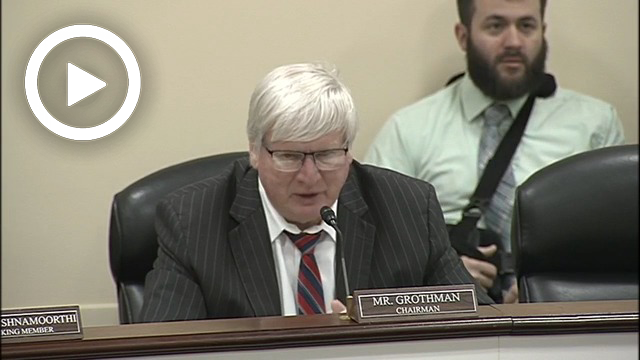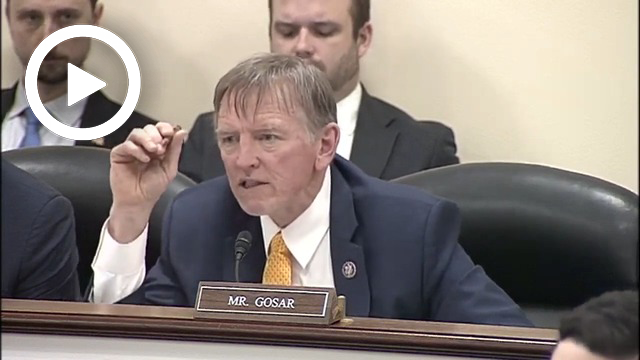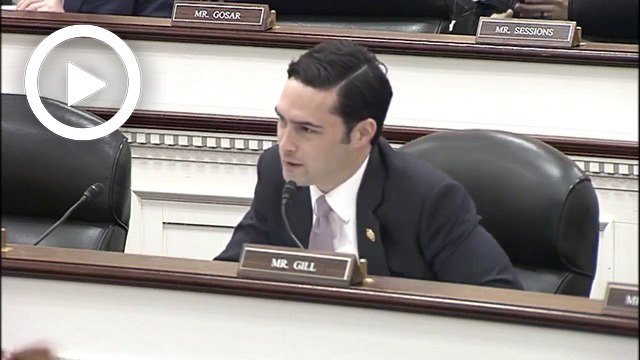Hearing Wrap Up: America’s Welfare State Needs Immediate Reform
WASHINGTON—The Subcommittee on Health Care and Financial Services held a hearing titled “Examining the Growth of the Welfare State, Part 1” to scrutinize the enormous expansion of welfare programs over the last 60 years and evaluate strategies to reform deficiencies in the welfare system. Members explained how the bloated welfare state encourages dependency on federal assistance, penalizes married couples, and incentivizes recipients to remain in the welfare state rather than seek out better opportunities for themselves and their families. Expert witnesses offered solutions that can be implemented at the federal and state levels to ensure taxpayer dollars are protected from future abuse. During the 119th Congress, the Subcommittee will work with the Trump Administration to cut back on unnecessary government spending and empower American workers and families through reforms to the deficient welfare state.
Key Takeaways
America’s welfare state has “waged a war on marriage,” trapped low-income individuals in poverty, and fostered long-term dependence on government assistance.
- Robert Rector, Senior Research Fellow at The Heritage Foundation, explained how the welfare state discourages marriage, especially among low-income households: “Welfare marriage penalties exist because welfare benefits are based on the joint income within a household. The welfare state operates like the income tax would if it lacked the category of ‘married filing jointly’…Reducing marriage penalties would significantly increase marriage rates. One study, for example, finds that reducing the marriage penalty in the EITC by $1,000 would increase the marriage rate among of low-income women by 10 percent.”
- Patrice Onwuka, the Director of the Center for Economic Opportunity at Independent Women, detailed how duplicative welfare programs have created a “dizzying maze of dozens of agencies” that often carry out the same functions without oversight mechanisms in place to track spending: “The U.S. spends $1 trillion on over 80 anti-poverty programs. This has created an environment for duplication, waste, fraud, and abuse. The Congressional Research Services found that 15 different agencies provide food aid, 13 housing, 12 health care, and five cash aid.”
Reforms must be implemented to reduce waste, fraud, and abuse of taxpayer dollars caused by our deficient and duplicative welfare system.
- Ms. Onwuka answered “it is true” that welfare programs do not require recipients to maintain employment and explained how Congress can work with states to close this loophole: “It is true. When we look at a number of different programs, we see that either states have exempted individuals in their jurisdiction from work requirements or that there are programs that just simply don’t have them. And so those are loopholes that I think should be closed. And Congress can work with states to ensure that states are not waiving these requirements.”
- Rep. Pete Sessions (R-Texas) offered a commonsense solution to remove marriage penalties from the welfare state by implementing simplified programs that provides accurate monetary support based on income level, marital status, and employment: “I think there ought to be a sliding scale up and down instead of ‘you don’t qualify’ or ‘we do this’…I’m trying to say, it seems like we could have a workbook, a paper that would say, okay, here’s where you got to be. You’re at this and our job is to try and get you there and then make it easier for someone that is married to stay married because then there’s less back and forth.”
The Oversight Committee will assist the Trump Administration in reining in the runaway welfare state and tackling waste, fraud, and abuse in the federal government.
- Witnesses and members highlighted the recent work of Elon Musk and the Trump Administration to shrink the welfare state and return welfare benefits to their original purpose of helping Americans escape poverty. Additionally, Members highlighted President Trump’s immediate efforts to secure America’s border and ensure illegal immigrants no longer receive the services and federal benefits they enjoyed under the Biden Administration.
Member Highlights
Subcommittee on Health Care and Financial Services Chairman Glenn Grothman (R-Wis.) uncovered evidence of the federal government’s inability to track how many taxpayer dollars are spent on each welfare recipient. He also pointed out how welfare programs are designed to punish traditional marriage.
Subcommittee Chairman Grothman: “Do you know about how much we spend a day on what we refer to as welfare programs?”
Mr. Rector: “…We don’t even know how much money we spend. There’s no federal record of total spending on means-tested programs for children. You have to go through the budget line-by-line and bring it out. And when you find it, it’s an enormous amount of money. And we don’t know where that money goes. If you were to go to any state in the United States and take any given family and ask the question, how much does this family get from welfare, no one knows the answer to that because they’re getting benefits from six or seven programs at the same time. It’s all disparate. The programs don’t talk to each other and there’s no record on how much they get. So one of the clear things we ought to have is a clear record of what the family gets, integrated so we know that. We also want to put that into our poverty measurements.”
…
Subcommittee Chairman Grothman: “How many welfare programs penalize married couples, about do you think?”
Mr. Rector: “There are 90 such programs, every single one of them has a significant marriage penalty. The way to understand these programs is that if you had the income tax code where you didn’t have a category ‘married filing jointly’ so that as soon as you got married, you would be moved into a higher tax bracket, and you would be penalized. Every program is designed like that. It makes no sense.”
Rep. Paul Gosar (R-Ariz.) noted that expanded Medicaid programs implemented during the COVID-19 pandemic remain in place, enabling able-bodied adults to collect benefits while staying out of the workforce.
Rep. Gosar: “I’m glad you brought up COVID, you know, because we went on a spending spree of $4.8 – $7 trillion dollars. Not a single receipt exists out there…So can you tell me a little bit more about, in your opinion, did these continued enrollment opportunities for Medicaid — how does it build up waste, fraud and abuse?”
Ms. Onwuka: “During COVID, obviously, and frankly during recessions, we tend to see the enrollment in Medicare and some of the other welfare programs increase. Now, that said, the economy has bounced back. And so as people gain employment, they should fall off things like SNAP, they should fall off certain programs. But we haven’t seen that and COVID supercharged that…So when you remove work requirements, you provide waivers for states and you create these loopholes where states can certainly roll people into these different programs, regardless of what their resources are or their income. Then that’s how you see these enrollments increase. And it’s a shame that we’re spending as much money that we are and our enrollment numbers are not falling. That’s telling us something.”
…
Ms. Onwuka: “It’s concerning when you have so many able-bodied people, we’re not talking about people who have disabilities or are not able to work, but able bodied people who are participating in programs like Medicaid because it’s been expanded so much. You’re talking about 60% of able-bodied adults on Medicaid. 25 million Americans who are reporting no earned income. So that’s telling us that there are people who can work. We know that there are millions of open positions and they’re participating in the Medicaid program, but they’re not working. That’s a problem that needs to be fixed.”
Rep. Brandon Gill (R-Texas) described one of the welfare state’s most egregious abuses of taxpayer dollars — the funding of health care, childcare, student loan repayment, and more for illegal immigrants.
Rep. Gill: “My colleagues on the other side of the aisle like to say that illegal aliens can’t get welfare. I think that that is verifiably not true. In fact, illegal aliens and their families can receive welfare from about over a dozen different programs.
“I’ll list out a few of them: Food stamps, child nutritional programs, Temporary Assistance for Needy Families, Supplemental Security Income, Child Care and Development BLOCK Grants, The Earned Income Tax Credit, The Child Tax Credit, Obamacare Premium Tax Credit, Obamacare Cost Sharing Subsidies, Medicare, Medicaid, The Children’s Health Insurance Program, Pell Grants, Student Loans, Head Start, Public Housing, and the Coronavirus State and Local Fiscal Recovery Fund. Whenever we think about how much money we’re giving to illegal aliens, the numbers really are absolutely staggering….According to various estimates, we’re spending right around $50 billion on the federal level on illegal aliens and their families and about $100 billion a year on the state level as well.”
###


